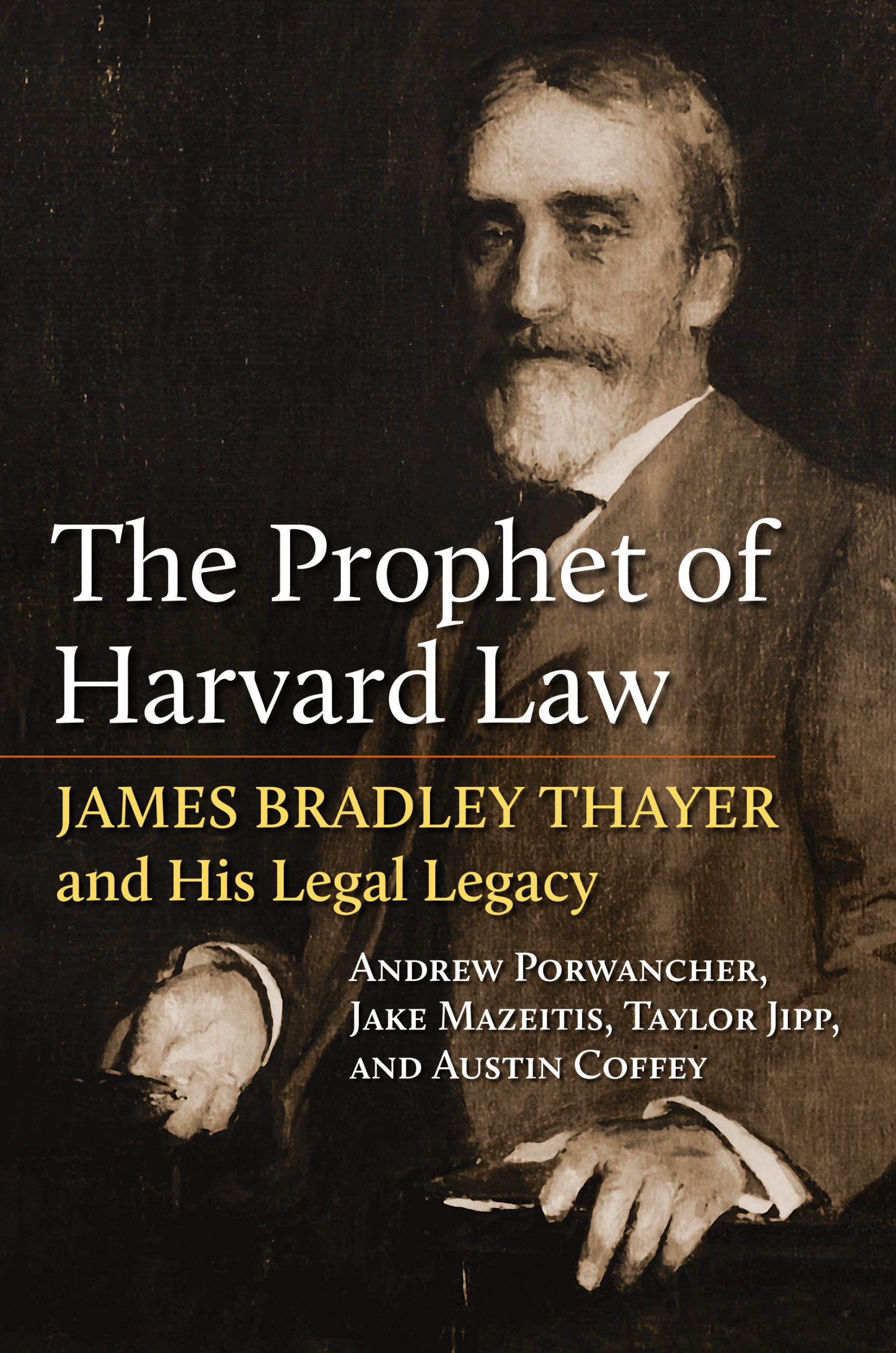Starting Points Journal: “The Strange Birth (and Strange Death) of Judicial Restraint”
By Andrew Porwancher
“In the spring semester of 1856, a 25-year-old student at Harvard Law named James Bradley Thayer submitted an entry into the school’s annual essay competition. Undoubtedly, he had the cash prize in mind. After all, Thayer did not descend from Boston’s patrician class that dominated Harvard; he had to fund his own education, given his family’s limited means. The winner of the essay competition would receive $60, a considerable sum at a time when Harvard Law cost around $300 annually. Pursuant to the competition’s rules, Thayer produced his essay under a pseudonym. He attached an accompanying envelope that featured the same pseudonym on the outside and his true identity enclosed within. The faculty members could not have been terribly surprised when the essay they selected for “first prize” turned out to be Thayer’s handiwork; he ranked first in his class. While the cash award was a welcome development for Thayer, the real value of the essay lay in the germ of an idea limned in its pages, an idea that would change the course of constitutional history: judicial restraint.
Thayer’s winning thesis previewed the argument for which he would later become famous. He insisted that judges can nullify laws only when the legislature brazenly oversteps its constitutional limits. On matters of policy, he declared, “The judiciary may not substitute their discretion for that of the legislature…”
Read the rest of the piece at Starting Points Journal >>
The Prophet of Harvard Law: James Bradley Thayer and His Legal Legacy
By Andrew Porwancher, Austin Coffey, Taylor Jipp, and Jake Mazeitis
 Amid the halls of Harvard Law, a professor of legend, James Bradley Thayer, shaped generations of students from 1874 to 1902. His devoted protégés included future Supreme Court justices, appellate judges, and law school deans. The legal giants of the Progressive Era—Holmes, Brandeis, and Hand, to name only a few——came under Thayer’s tutelage in their formative years.
Amid the halls of Harvard Law, a professor of legend, James Bradley Thayer, shaped generations of students from 1874 to 1902. His devoted protégés included future Supreme Court justices, appellate judges, and law school deans. The legal giants of the Progressive Era—Holmes, Brandeis, and Hand, to name only a few——came under Thayer’s tutelage in their formative years.
He imparted to his pupils a novel jurisprudence, attuned to modern realities, that would become known as legal realism. Thayer’s students learned to confront with candor the fallibility of the bench and the uncertainty of the law. Most of all, he instilled in them an abiding faith that appointed judges must entrust elected lawmakers to remedy their own mistakes if America’s experiment in self-government is to survive.
In the eyes of his loyal disciples, Thayer was no mere professor; he was a prophet bequeathing to them sacred truths. His followers eventually came to preside over their own courtrooms and classrooms, and from these privileged perches they remade the law in Thayer’s image. Thanks to their efforts, Thayer’s insights are now commonplace truisms.
The Prophet of Harvard Law draws from untouched archival sources to reveal the origins of the legal world we inhabit today. It is a story of ideas and people in equal measure. Long before judges don their robes or scholars their gowns, they are mere law students on the cusp of adulthood. At that pivotal phase, a professor can make a mark that endures forever after. Thayer’s life and legacy testify to the profound role of mentorship in shaping the course of legal history.
Order now from University Press of Kansas or Amazon >>
 Andrew Porwancher is the Wick Cary Associate Professor of Constitutional Studies at the University of Oklahoma. From 2020–2022, he is serving as the Ernest May Fellow at Harvard’s Belfer Center. Aside from The Jewish World of Alexander Hamilton, Porwancher is the author of The Devil Himself: A Tale of Honor, Insanity, and the Birth of Modern America (Oxford, 2016), which was adapted into a theatrical presentation in Dublin, and John Henry Wigmore and the Rules of Evidence: The Hidden Origins of Modern Law (Missouri, 2016), an inaugural volume in the series “Studies in Constitutional Democracy.”
Andrew Porwancher is the Wick Cary Associate Professor of Constitutional Studies at the University of Oklahoma. From 2020–2022, he is serving as the Ernest May Fellow at Harvard’s Belfer Center. Aside from The Jewish World of Alexander Hamilton, Porwancher is the author of The Devil Himself: A Tale of Honor, Insanity, and the Birth of Modern America (Oxford, 2016), which was adapted into a theatrical presentation in Dublin, and John Henry Wigmore and the Rules of Evidence: The Hidden Origins of Modern Law (Missouri, 2016), an inaugural volume in the series “Studies in Constitutional Democracy.”
Porwancher previously served as the Horne Fellow at Oxford and the Garwood Fellow at Princeton, and held senior research fellowships at the Straus Center (Yeshiva) and Clements Center (Texas). In 2017, he won the Longmire Prize for innovation in teaching. He is now at work on his fifth book, Theodore Roosevelt and the Jews (under contract with Princeton).
Professor Porwancher is a JMC fellow.
Learn more about Andrew Porwancher >>
![]()
![]() Follow us on Facebook and Twitter for updates about lectures, publications, podcasts, and events related to American political thought, United States history, and the Western political tradition!
Follow us on Facebook and Twitter for updates about lectures, publications, podcasts, and events related to American political thought, United States history, and the Western political tradition!
Want to help the Jack Miller Center transform higher education? Donate today.
